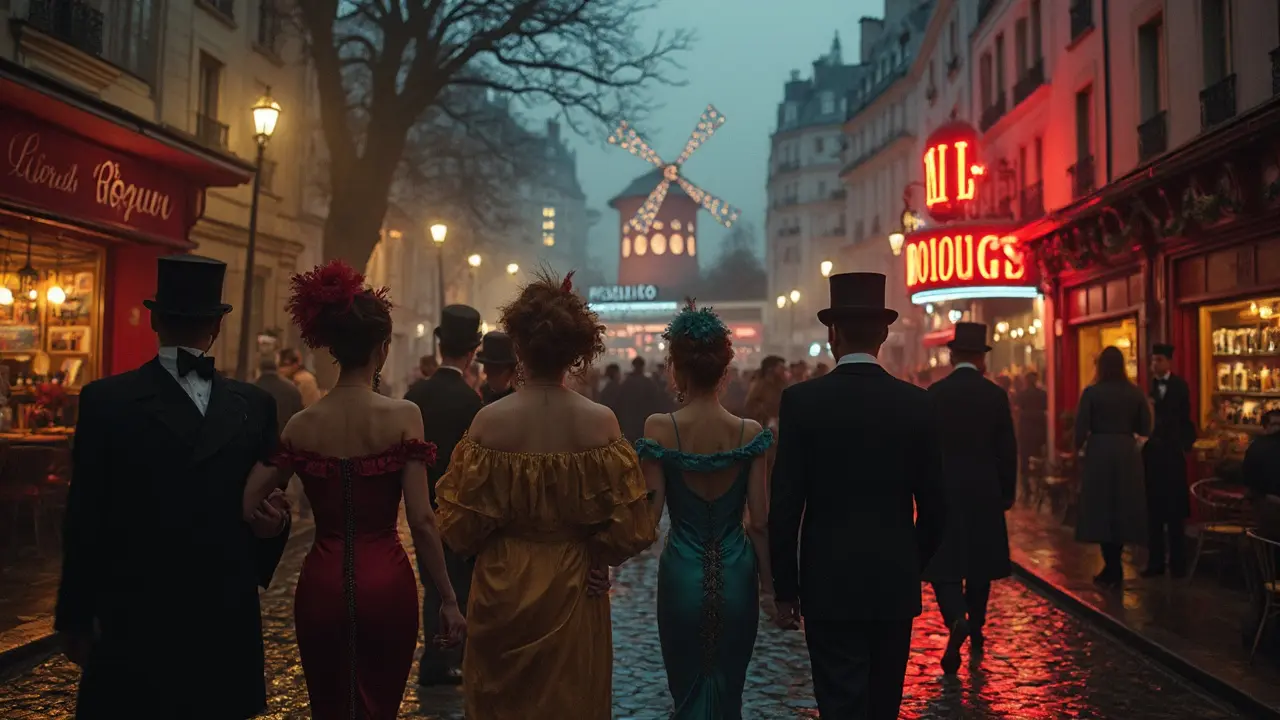Paris didn’t earn its “city of love” nickname for nothing. Escort services in the city have deep roots going back centuries, and their story is way more interesting than most folks realize. It’s not just about dark alleys or shady deals—escorts in Paris often moved in high circles, influencing art, fashion, and even politics.
Most people picture the modern escort scene, but this world actually started with brothels and street workers along the old boulevards. Over time, their role changed, sometimes openly, sometimes hiding in plain sight. The French love for pleasure, style, and freedom did a lot to shape this underground market. And Paris itself, being the stomping ground for kings, artists, and outcasts, made escorting both risky and strangely respectable at different times.
If you’re curious about why Paris keeps popping up in movies and stories about forbidden love, you’re on the right track. It’s not just a cliché—it’s based on long traditions. Stick around for a wild ride through the secret corners of the city, and you’ll come away seeing Paris, and escort services, with totally new eyes.
- Beginnings: Escorts and Sex Work in Old Paris
- High Society, Courtesans, and the Golden Era
- Modern Escorts: Laws, Change, and Survival
- Tips and What People Get Wrong About Escorts in Paris
Beginnings: Escorts and Sex Work in Old Paris
If you picture Paris back in the Middle Ages, you'd probably see way more action than the fancy stuff you see today. Sex work was everywhere—around Notre-Dame, along the banks of the Seine, and hidden just a block from the king’s palace. Most records from the 1300s to the 1600s mention hundreds of brothels, cheekily called “maisons de tolérance.” The French government actually made brothels legal as far back as 1256, hoping that official rules would keep things from getting out of hand.
Back then, being an escort or sex worker wasn't always seen as bottom-of-the-barrel. It was more like a job with rules, fees, even assigned uniforms. In fact, by the 15th century, Paris had whole neighborhoods—like the rue Gravois (now rue St-Denis)—famous for their brothels and the women who worked there. The city taxed these businesses, and even set up their own inspectors, a bit like today’s restaurant health checks.
| Year | Number of Legal Brothels in Paris | Notable Changes |
|---|---|---|
| 1350 | About 30 | Church tries to clamp down |
| 1500 | 50+ | Brothels taxed and regulated |
| 1800 | 140 | Paris police regulate sex work clinics |
Now, about the girls themselves—some were just trying to survive, but others had regulars in high society. A few even moved up the social ladder, landing gifts, apartments, or a safe spot away from poverty. Sex work wasn’t secret, either. You see it in old paintings, scandals, and even royal documents. King Louis IX tried to outlaw it, but realized it was easier to manage than squash. By the 18th century, Paris was the place for pleasure, drawing in travelers from across Europe just for a taste of its nightlife.
So, the escort Paris scene has been part of the city’s bones forever. The mix of rules, scandal, and “anything goes” attitudes set the stage for everything that came later—including those ritzy escorts and nightclubs you hear about today.
High Society, Courtesans, and the Golden Era
If you think escort services in Paris were just about secret meetings and sneaky handshakes, you haven’t met the courtesans of the 18th and 19th centuries. These women were more than companions—they were stars. Mix celebrities with influencers, throw in some politics, and you’ll get the picture. The big names included La Païva, Cora Pearl, and Liane de Pougy. They were famous not just for beauty, but for controlling the room, shaping taste, and even swaying the decisions of the rich and powerful.
Being a top courtesan in Paris meant you might own your own mansion on the Champs-Élysées or dine with dukes and royalty. French writer Alexandre Dumas even based characters on them in his well-known books. Their influence was huge, far beyond what most people expect from the escort Paris scene today. Here’s the jaw-dropping part: the Parisian government actually regulated brothels and accepted their role in society, especially during the Belle Époque (late 19th and early 20th centuries).
| Courtesan | Era Active | Famous For |
|---|---|---|
| La Païva | 1850s-1870s | Her marble mansion on Champs-Élysées, lavish parties, and marrying a Prussian count |
| Cora Pearl | 1860s-1880s | Wild parties, connections to the elite, inspiration for writers |
| Liane de Pougy | 1890s-1920s | Ballet dancing, best-selling books, high-profile love affairs |
This golden era wasn’t just about rich men spending money. Courtesans shaped fashion, set social trends, and even influenced French law. Brothels (“maisons closes”) were legal and kept strict rules—some even had their own doctors and police controls. It wasn’t perfect, but it pushed Paris ahead of most other cities at the time for how sex work was handled.
- Cafés and nightclubs popped up specifically for courtesans and their clients right next to theaters and power spots.
- Courtesans had fancy calling cards, the 19th-century version of Instagram followers.
- Some built serious fortunes; records show Cora Pearl spent over 400,000 francs on a single bathtub (that’s like millions today).
The image of Paris as a place where anything was possible wasn’t just a myth. The pattern was set back then: if you had confidence, charm, and the right contacts, you could shape not just your life, but the life of the city.

Modern Escorts: Laws, Change, and Survival
Fast forward to today, and the escort world in Paris looks way different than it did even 30 years ago. The most important thing to know is that French laws around sex work have changed a lot. Up until 2016, selling sex wasn’t exactly illegal, but soliciting in public could land you a fine. Then things took a big turn with the 2016 law that cracked down on buying sex. Suddenly, clients—not just workers—could face hefty penalties, pushing the whole industry deeper underground.
Check out this quick breakdown of key laws and impacts:
| Year | Law/Change | Main Impact |
|---|---|---|
| 1946 | Brothels banned | Forced sex work off the streets and into the shadows |
| 2003 | Security laws | Increased policing of public spaces, more risk for street workers |
| 2016 | Client criminalization | Harsh penalties for buyers (up to €1,500 fine), more danger for workers |
With police cracking down on street work and brothels long gone, most escorts in Paris have shifted online. Websites, small agencies, and social media now connect clients and escorts. There are even encrypted messaging apps designed for safety. Instead of standing on a corner, escorts set up private meets at hotels or apartments, trying to avoid attention.
One myth is that this new approach means everyone’s safer, but it’s not so simple. After the 2016 law, groups like Médecins du Monde saw a jump in safety risks and fewer escorts going to the doctor. The law made it tougher for them to spot fake clients or get support from police. It also made scammers and abusive customers bolder, since workers have more to lose by reporting them.
So how do escort Paris operators and workers adapt? Some clear patterns stand out:
- Tech-savvy advertising (on dating apps, not just classic websites)
- Interviewing clients before the meet, usually by video or phone
- Setting boundaries and using code words for risks or emergencies
- Collaborating with networks like STRASS, a French sex workers’ union, for legal tips and help
Anyone visiting Paris might be surprised by how hidden and organized the scene is compared to its flashy movie image. The mix of old laws, new tech, and changing attitudes keeps things in constant motion. If you’re trying to understand this world or navigate it safely, it pays to know both the real dangers and how modern escorts are working to stay a step ahead.
Tips and What People Get Wrong About Escorts in Paris
People have a lot of wild ideas about what an escort in Paris is really like. Most of it is just movie stuff. For example, not every escort is working in secret, nor are they all attached to danger or luxury. Let’s cut through the myths with facts and some advice if you’re thinking about the Paris scene.
First, escorts are not the same as street workers or brothel staff. Many Paris escorts work independently, use agencies, or advertise online. The escort Paris scene is pretty organized. This isn’t a shady game; most good agencies require background checks and set up clear terms. Escorts are often multilingual, experienced with travelers, and know the city like cab drivers do.
Here's a breakdown of public perceptions vs. reality:
| Common Misconception | Reality |
|---|---|
| All escorts work illegally | The law targets clients, not escorts, since 2016. Being an escort isn’t a crime, but buying their services can be. |
| Escorts are uneducated or desperate | Some have college degrees, speak several languages, and choose escorting for flexible hours or high pay. |
| It’s easy to spot an escort in public | Most blend in and act like regular Parisians, meeting clients in hotels, cafes, or fancy events. |
| Escorts are always female | Paris has a growing male escort and LGBTQ+ scene, with high demand from all walks of life. |
Some practical tips if you’re new to this world:
- Don’t believe every ad or website. Scams exist. Use well-known agencies or personal recommendations.
- Be clear on the law. As of 2025, it’s illegal to buy sexual services, but hiring an escort for dinner, events, or company is legal. Police focus on the buyer if anything shady happens.
- Clear communication is everything. Discuss rates, boundaries, and expectations before meeting up. Parisian escorts expect politeness and respect—rudeness gets you nowhere.
- Don’t expect sex. Many real Paris escorts focus on companionship, conversation, even sightseeing. Booking time doesn’t guarantee intimacy, and pressuring is a surefire way to end things quickly.
The Paris escort scene is just as much about personal connection and trust as anything else. As wild as its reputation might be, it really pays to know the facts and treat people right. You’ll get a lot further in the city—and avoid awkward surprises.



